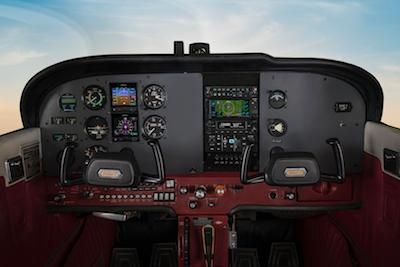Sat, Mar 31, 2018
Multiple Beechcraft, Piper Models Now Approved For Installation
The FAA has granted Supplemental Type Certification (STC) approval for the Garmin GFC 500 autopilot in several more aircraft models. Intended for qualifying piston single-engine aircraft below 6,000 lbs., the GFC 500 delivers superior in-flight characteristics, self-monitoring capabilities and minimal maintenance needs when compared to older generation autopilot systems.

The GFC 500 autopilot uniquely integrates with the G5 to provide pilots with an economical and highly capable autopilot along with a modern electronic flight instrument. The autopilot mode controller contains large dedicated keys and knobs, a control wheel that allows for easy adjustments to aircraft pitch, airspeed and vertical speed and a level button that returns the aircraft to straight-and-level flight. The GFC 500 servos also contain a brushless DC motor and a gear train that eliminates the need for a maintenance-prone mechanical slip clutch. G5 provides input and display of altitude preselect, heading, vertical speed target, airspeed target and Flight Director command bars for the GFC 500. An optional GAD29 adapter allows the GFC 500 and G5 to interface with select Garmin GPS or VHF navigators.
- The latest approvals for the GFC 500 autopilot include the following aircraft:
- Beechcraft Bonanza S35, V35, V35A and V35B
- Piper PA-28-150/151/160/161/180/181
The full-featured GFC 500 autopilot provides thousands of existing general aviation aircraft with a simple, light-weight and cost-effective autopilot upgrade path. The GFC 500 incorporates solid state attitude sensors with robust self-monitoring capabilities to provide superior autopilot performance, greater reliability and safety benefits that are similar to the popular GFC 700 autopilot.
In addition to traditional autopilot capabilities such as altitude hold, vertical speed and heading modes, the GFC 500 also includes:
- Premium functions and advanced capabilities such as altitude pre-select and indicated airspeed hold mode. VNAV will be a growth function when appropriately equipped.
- Pilots can select, couple and fly various instrument approaches, including GPS, ILS, VOR, LOC and back course approaches.
- Built-in GPS roll steering capability eliminates the need for external roll steering converters, allowing for smoother navigation tracking when installed with a compatible navigator.
- Level Mode button, which automatically engages the autopilot to restore the aircraft to straight and level flight.
- Underspeed protection helps prevent the pilot from stalling the aircraft.
- Overspeed protection helps prevent the pilot from exceeding aircraft maximum speed (VNE).
- With the addition of an optional yaw servo, Yaw Damper (YD) mode minimizes yawing oscillations while also helping to maintain coordinated flight by keeping the slip/skid indicator centered.
- Flight Director command bars can be displayed on the G5 when paired with the GFC 500.
- Pilots can fly coupled ‘go-arounds’ during missed approach sequencing. A remotely-installed go-around button commands the Flight Director to display the appropriate pitch attitude required for the missed approach procedure and activates a loaded missed approach when paired with a GTN 650/750 navigator.
- An optional pitch-trim servo adds automatic trim and manual electric trim.
As a standard feature, pilots receive Garmin ESP with the GFC 500 autopilot, which works to assist the pilot in maintaining the aircraft in a stable flight condition. ESP functions independently of the autopilot and works in the background to help pilots avoid inadvertent flight attitudes or bank angles and provide airspeed protection while the pilot is hand-flying the aircraft.
Garmin expects to further expand its list of aircraft models approved for the GFC 500 autopilot. Upcoming aircraft models include:
- Grumman AA-5 Traveler, AA-5A Cheetah, AA-5B/AG-5B Tiger
- Beechcraft Bonanza C33, C33A, E33, E33A, E33C, F33, F33A, F33C, G33
- Cessna 210L, T210L, 210M, T210M, 210N, T210N
- Mooney M20 (models to be determined)
- Piper PA-32 (models to be determined)
(Image provided with Garmin news release)
More News
Ultrahigh Frequency (UHF) The frequency band between 300 and 3,000 MHz. The bank of radio frequencies used for military air/ground voice communications. In some instances this may >[...]
During The 7 Second Descent, There Was Another TAWS Alert At Which Time The Engine Remained At Full Power On October 24, 2025 at 2115 mountain daylight time, a Cirrus SR22T, N740TS>[...]
From 2009 (YouTube Edition): Educational Organization Aims to Inspire by Sharing Tuskegee Story Founding leader Don Hinz summarized the Red Tail Project’s mission in simple, >[...]
“This feels like an important step since space travel for people with disabilities is still in its very early days... I’m so thankful and hope it inspires a change in m>[...]
Also: New Katanas, Kern County FD Training, IndiGo’s Botched Roster, MGen. Leavitt Named ERAU Dean The Australian Transportation Safety Bureau (ATSB) has wrapped up its inves>[...]
 ANN's Daily Aero-Term (12.19.25): Ultrahigh Frequency (UHF)
ANN's Daily Aero-Term (12.19.25): Ultrahigh Frequency (UHF) NTSB Prelim: Cirrus Design Corp SR22T
NTSB Prelim: Cirrus Design Corp SR22T Classic Aero-TV: The Red Tail Project--Carrying the Torch of the Tuskegee Airmen
Classic Aero-TV: The Red Tail Project--Carrying the Torch of the Tuskegee Airmen Aero-News: Quote of the Day (12.19.25)
Aero-News: Quote of the Day (12.19.25) Airborne 12.17.25: Skydiver Hooks Tail, Cooper Rotax Mount, NTSB v NDAA
Airborne 12.17.25: Skydiver Hooks Tail, Cooper Rotax Mount, NTSB v NDAA



